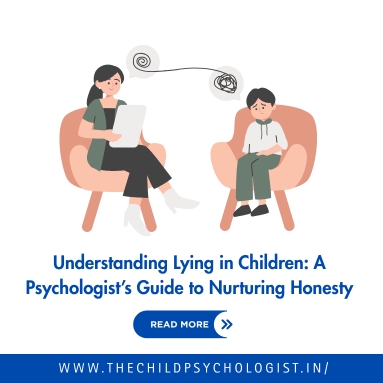By Dr. Vini Jhariya | Child & Clinical Psychologist | Founder, Urjasvini Child Development Center, Indore
Why Children Lie — And What It Means
When your child lies, it can be frustrating and even worrisome. Does it mean they’re becoming dishonest? Have you done something wrong as a parent?
The truth is, lying is a normal part of child development. It often stems from curiosity, emotional needs, or a developing imagination, not moral failure. At Urjasvini Child Development Center, we help parents understand these behaviors and guide their children gently toward honesty.
If you’re searching for a trusted kids therapist near me or expert guidance on childhood behavioral issues, this guide offers a clear, compassionate path forward.
Why This Topic Matters
Children who lie aren’t “bad”—they’re often trying to manage emotions, avoid consequences, or express themselves. When parents understand why a lie is told, they can respond with empathy instead of punishment.
As a qualified counselor therapist, I’ve seen firsthand how emotional safety and open communication can transform a child’s behavior and self-worth.
Why Do Children Lie? Key Insights from Child Psychology
- Fear of Punishment
Kids lie to avoid getting into trouble, especially if they fear harsh reactions.
- Seeking Attention
Children may exaggerate or fabricate stories to gain approval or validation.
- Imaginative Play
Younger children often blur the lines between reality and imagination—not to deceive, but to explore.
- Avoiding Disappointment
They may hide the truth to avoid hurting a parent’s feelings or letting them down.
- Testing Boundaries
As they grow, children experiment with lying to assert independence or explore social rules.
Common Types of Lies in Children
- White Lies: To avoid hurting someone’s feelings
- Lies of Omission: Leaving out facts to avoid blame
- Exaggerations: Boosting a story for attention
- Denial Lies: Denying actions out of fear or panic
- Manipulative Lies: Intentional deceit, often needing deeper behavioral support
If you notice persistent or manipulative lying, it may signal emotional distress or childhood disorders that require expert assessment.
How Lying Evolves with Age
- Ages 2–5: Lies are imaginative and impulsive. Children are still learning what “truth” means.
- Ages 6–10: Lies become more socially influenced—aimed at avoiding punishment or seeking peer approval.
- Ages 11+: Teens lie more intentionally, often to protect privacy or avoid conflict.
Understanding this evolution helps parents set realistic expectations and tailor their responses with age-appropriate guidance.
When to Be Concerned About Lying
Consider seeking help from a child behavioral therapist if lying is:
- Frequent and unexplained
- Malicious or hurtful
- A cover for dangerous behaviors (like sneaking out or academic issues)
Professional behavior counseling can help uncover the root causes and provide tools for long-term positive change.
7 Psychologist-Recommended Ways to Encourage Honesty
- Model Honesty
Children mimic what they see. Be truthful—even about small things.
- Praise Truthfulness
Acknowledge your child’s courage when they tell the truth, especially when it’s hard.
- Avoid Harsh Punishment
Extreme reactions often lead to more lying. Use consequences that teach, not punish.
- Create an Emotionally Safe Environment
Let your child know it’s okay to make mistakes, as long as they’re honest.
- Use Stories and Real-Life Examples
Books or relatable scenarios can teach the value of honesty in a non-threatening way.
- Respond Calmly to Lies
Ask with empathy: “What made you say that?” This encourages openness rather than defensiveness.
- Teach Problem-Solving
Show your child better ways to deal with mistakes or pressure. Lies often stem from poor coping skills.
Free Resource for Parents
Download our “Truth-Telling Toolkit – 5 Gentle Scripts for Handling Lies”
Available exclusively at Urjasvini Child Development Center, Indore
This practical guide gives you therapist-approved phrases and tips to support honest conversations at home.
Lying Is a Phase—Honesty Is a Practice
Lying in children is usually a temporary and manageable behavior, not a reflection of poor values. With your understanding, patience, and the right approach, your child can learn that honesty brings safety, trust, and respect.
If you’re noticing patterns of dishonesty, secrecy, or emotional withdrawal, we’re here to help. As experienced counselor therapists and behavior experts, we support children through personalized guidance that fosters growth and connection.
